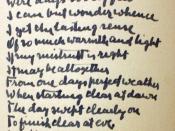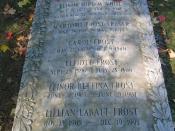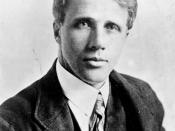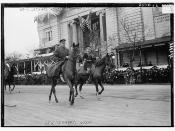Commitment vs. Fantasy in Robert Frost's "Stopping by Woods on a Snowy Evening"In "Stopping by Woods on a Snowy Evening," Robert Frost dramatizes the conflict between the speaker's life obligations with the allurement of death. Frost describes the scene of a man, who stops to look at the woods on a snowy winter evening and wishes to stay despite the coldness of the night. Frost uses various forms of imagery and symbolism to create an atmosphere of composure and beauty mixed with a feeling of ambiguity throughout the poem. Even though some see the poem as a depiction of beauty, the powerful symbol of the woods emphasize that the speaker is more interested in the attraction of death, but ultimately feels the greater need to continue in order to fulfill his duties in life.
Frost begins the poem simply by setting a vivid scene which provides the basis of imagery to create a tone of alienation with a serene mood.
It describes the faraway location of the woods, implying the isolation it forms between the traveler and civilization, a restricted area that man should not cross. The speaker has for a moment stopped his journey to watch "woods fill up with snow," being drawn by the dreamlike beauty and ambiguity of the landscape.
The second stanza provides information on the reason of his stopping with a more definite time and location. The traveler is so far out that the horse "must think it queer" to stop far away from town, knowing instinctively that it is dangerous. Shifting the focus point to the horse's reaction creates reality of the situation and a greater emphasis on their stop. The division between the "woods and the frozen lake" illustrate the division between fantasy and reality. The next lines disclose that it is the "darkest evening of the year," literally and emotionally. The emphases placed on darkness represent the unnamed troubles and despondency, without light and hope.
In the third stanza, the traveler observes more of his surroundings and is overwhelmed by his attraction. The horse once again tries to gain his attention by giving his "bells a shake", but is consumed by the softness of the "the sweep / Of easy wind and downy flake." The scene becomes more dreamlike, attracting his attention with the snowy woods, removing him from the boundaries of society.
In the final stanza, the rhyme scheme changes from the rest of the poem in the same way that the speaker breaks away from the beauty of the woods and death to returns to the obligations of his life and civilization. The fascination of the woods make the traveler wants to stay exactly where he is, where "the woods are lovely" and to the painless eternity. But he soon realizes the danger beneath the beautiful landscape. The word "but" in "but I have promises to keepâ¦" provides the transition to his ultimate decision. The traveler could have chosen the beautiful landscape, "but [he] has promises to keep." He also remembers the promise he made to society and comprehends that he must go home, not into the woods. The repetition of the last two lines, dramatizes the strength of the speaker's commitment to his promise, and realizes that he has many "miles" or roads not yet traveled, to continue at all cost before he may "sleep," or die. He still has many years to live before he takes the option of death.
On this dark night, the speaker is tempted to leave the world of worries and responsibility in order to enter the world of painless eternity; he however comes to realize the necessity and promises that he has made towards culture. Although there is something alluring about the attraction and beauty of nature, he comprehends that he must continue to live and face his problems. The woods offer a short escape from the obligations that society brings, but in the end realizes the importance of returning home.
Sources:Robert Frost "Stopping by Woods on a Snowy Evening"





